COVID-19 in Bihar: Exhausted, underpaid health workers and a crumbling public health system
With a surge in COVID-19 cases, low testing rates, exhausted, angry, underpaid and uncertain health workers in the state, Bihar is staring at a complete collapse of its public health system.
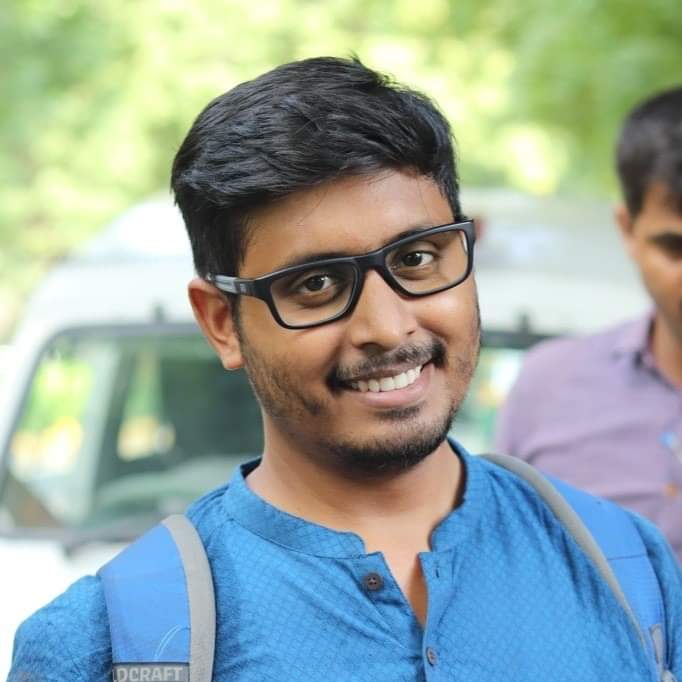
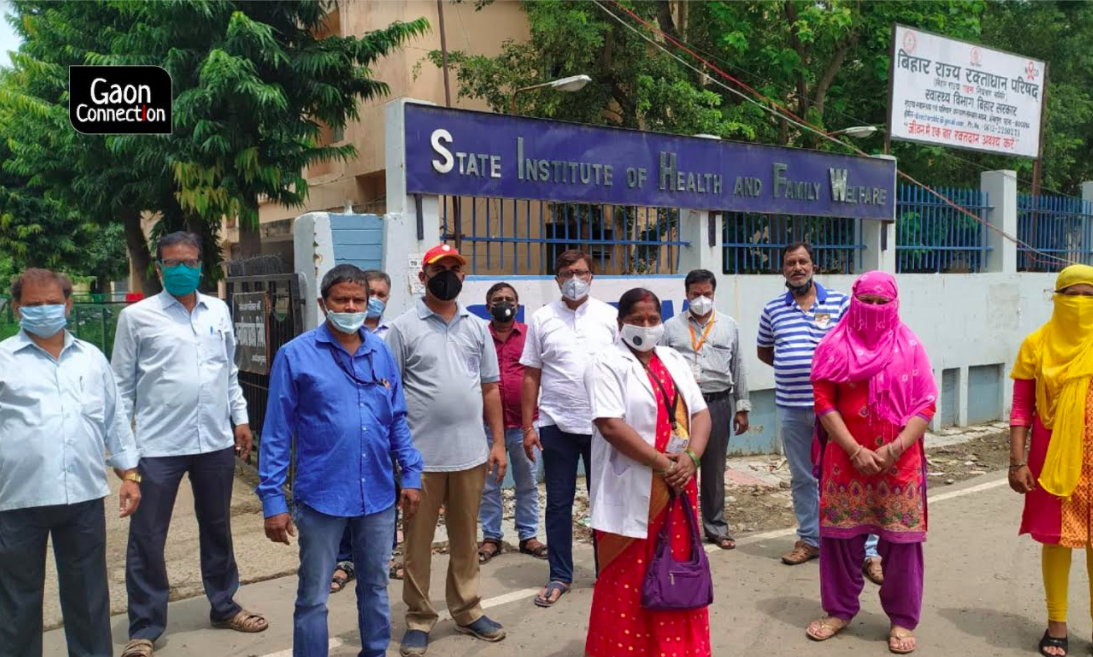
Health workers in Bihar are going on strike with an array of demands. Photo: Rohin Kumar
Rohin Kumar and Umesh Kumar Ray
The All India Institute of Medical Sciences (AIIMS) Patna witnessed an unprecedented scene Thursday morning. At least 400 nursing staff, serving on a contractual basis for many years, stood outside the gate and halted the functioning of the hospital demanding a hike in salary and facilities similar to what permanent staff is provided with.
“Our demands are to ensure equal work-equal pay, leaves equivalent to permanent employees, reservation or designated beds for doctors to ensure they get admission to AIIMS,” Ranvijay Kumar, Informal Workers Union, AIIMS, Patna, told Gaon Connection. “We also demand contractual nursing staff to be given preference while regularisation and outsourcing of nursing staff to be prohibited. Until this is ensured, the nursing staff would continue their strike,” he declared.
Bihar has been reporting over 1,000 COVID-19 cases since July 12. Social media platforms are flooded with videos of hapless coronavirus patients crying for help from different parts of the state. The monumental mismanagement of the state’s government hospitals has completely exposed the crumbling public health infrastructure and the Nitish Kumar government is facing the heat.
At such a point, health workers – right from those serving at AIIMS, to Accredited Social Health Activists to junior doctors – are exhausted, angry, and threatening to go on strike. In the past, the hospital authorities threatened them with stringent action, coercing them into continuing duty but lately, the intimidation tactics do not seem to be working.
The Indian Medical Association, Bihar Chapter has been vocal about the demands of health workers. According to IMA’s latest release, more than 200 medical professionals besides other paramedic staffs have tested positive for COVID-19 so far in the state.
Uncertainties loom over contractual health workers
Mohammad Javed Akhtar started serving as a contractual health worker in 2005 at a pay scale of Rs 6,500 per month. 14 years on, Akhtar now works at a Primary Health Centre in Bihar’s Bodh Gaya and earns a meagre Rs 12,800 per month, approximately. “Given the work responsibilities and inflation in the economy, the meager increment is inadequate,” Javed told Gaon Connection. The demand for pay revision intensified since 2011 but, in vain.
During COVID-19, the role of contractual workers is to assist patients from registration to screening and ranges to sealing of a COVID positive corpse.
“We understand the time is crucial and Bihar is grappled with COVID-19 and floods. That is why, in the larger interest of people, the strike was off on July 23,” Akhtar, who happens to be Bihar State Contractual Health Employees Federation state secretary, told Gaon Connection.
The major demands of these health staff hired under the National Health Mission (NHM) are pay revision, a 15 per cent increment in salary every year, regularisation of work under the state government, compensation of Rs 25 lakh to the kin of health workers who succumbed to COVID-19, and the payment of Employment Provident Fund.
The BSCHEF also demanded the state government initiate formation of Public Health Management Cadre, a cadre that will be responsible for taking care of contractual health staff, in case. “If our demands are not met in a month, by August 23, we would go on a state-wide indefinite strike,” Akhtar added.
Auxillary Nurse Midwives and Pharmacists
The members of All India Pharmacist Association (ABPA), Bihar Chapter, and Bihar Rajya Bal Swasthya Karyakram Auxillary Nurse Midwife Sangh, meanwhile, have been on an infinite strike since June 29, 2020.
Their role is to identify children with deformities from 0 to 18 years and ensure treatment for them. During the pandemic, they have acted as frontline workers and were engaged in door-to-door thermal screening for COVID-19 suspects. They were also assigned duty at quarantine centres, railway stations, and bus stands.
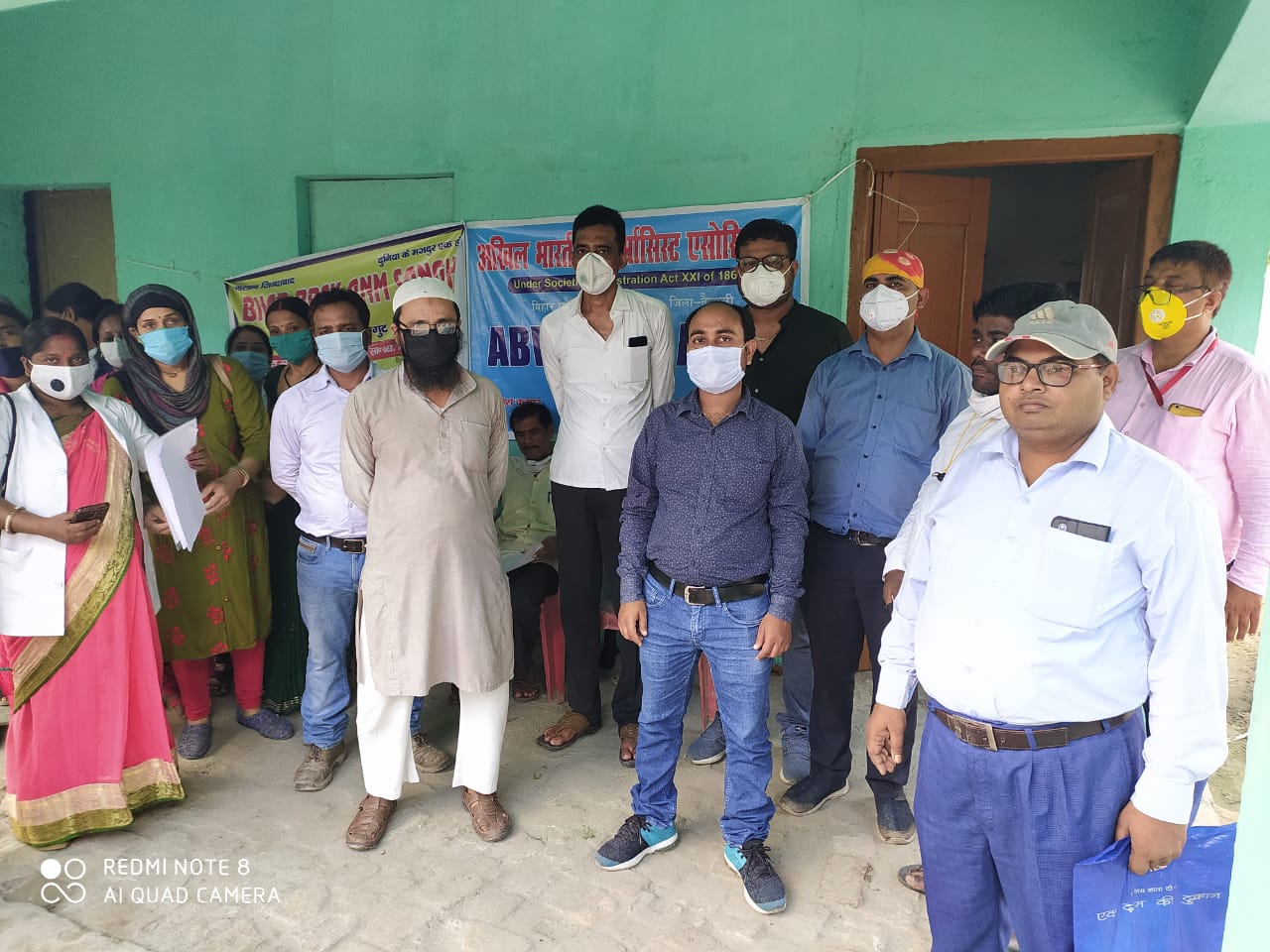
Under Rajya Bal Swasthya Karyakram (RBSK), in 2015, 2136 Aayush doctors, 1068 Pharmacists, and 1068 ANMs were recruited. Their designated salaries per month were Rs 20,000, Rs 12,000 and Rs 11,500 respectively. These were meant to be project basis positions. The project is monitored by the State Health Society (SHS). The SHS manages the NGO (Non-Governmental Organisation)/PPP (Public-Private partnership) components of the National Rural Health Mission in the state including the execution of contracts, disbursement of funds, and monitoring of performance.
In December 2018, the state government raised the salary of contractual pharmacists, who are recruited by the state health department, to Rs 37,000 per month. But, the salaries of ANMs and pharmacists under RBSK were raised only to Rs 27,300 per month. “The government raised salaries of Aayush doctors recruited with us in 2015 to Rs 44,000 per month. What is the issue in ensuring equal and respectable pay to ANMs and pharmacists under RBSK?” asked Rajeev Sinha, ABPA, Bihar Chapter state secretary.
“We are not saying the government must reimburse the arrears immediately. At least consider our demands and provide an official assurance. These are hard times and we want to contribute our best to the society,” Usha Kumari, secretary, Bihar Rajya Bal Swasthya Karyakram Auxillary Nurse Midwife Sangh told Gaon Connection.
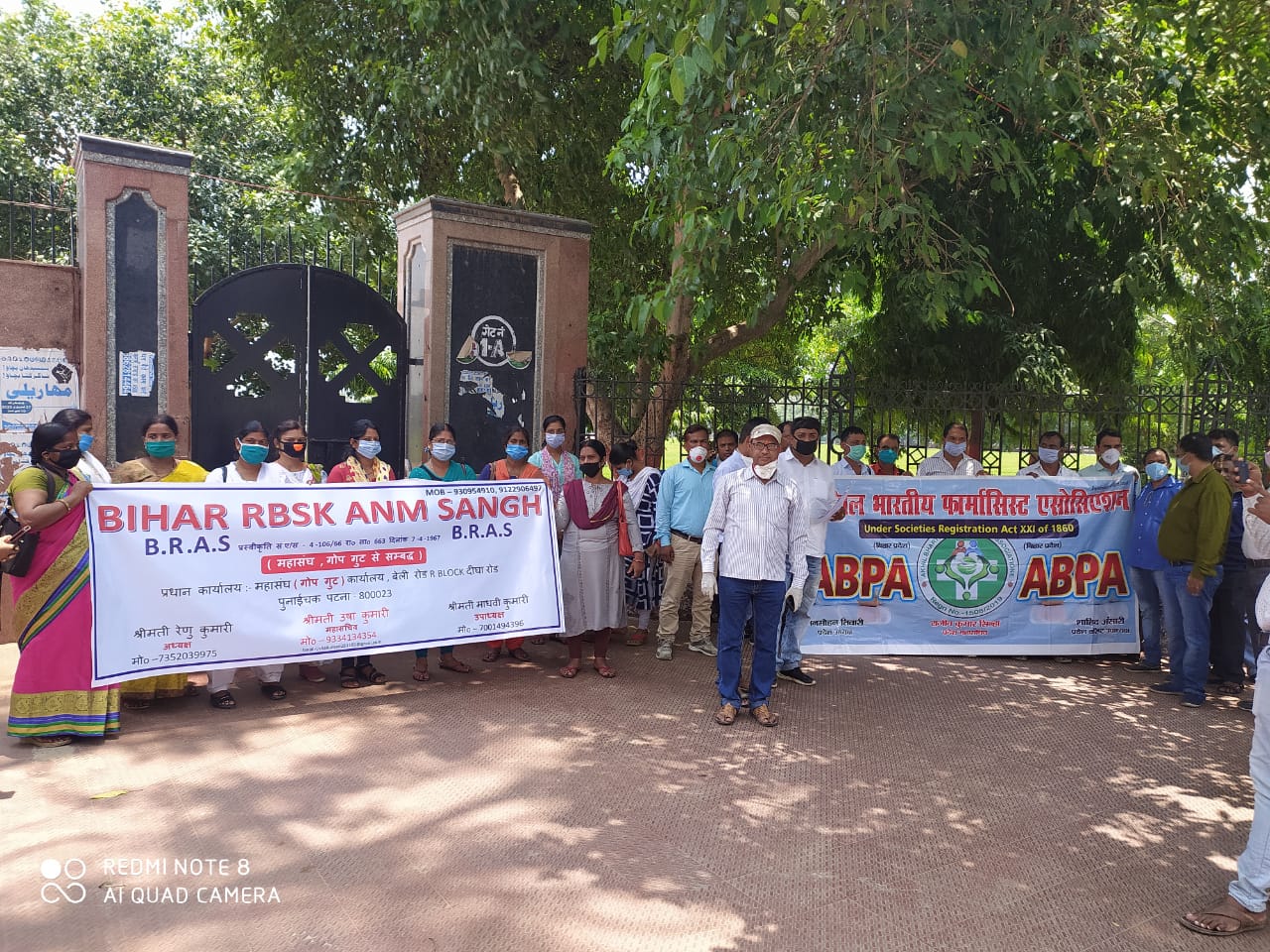
ASHA workers have been unpaid
Accredited Social Health Activists (ASHA) have an important role among frontline workers on the ground battling the COVID-19 pandemic but, they are neither getting adequate security nor money. This has forced them to go on strike next month. There are more than 90,000 ASHAs in Bihar.
“The coronavirus survey has been done thrice so far but, its payment has not been done yet, ” Anita Devi, an ASHA worker in Muzaffarpur told Gaon Connection.
The first case of coronavirus was reported in Bihar on March 22, 2020. Then, the Bihar government tasked ASHA workers to do door-to-door screening to make a list of people infected who came from abroad. The screening began on April 20 and lasted eight days. A second-round survey was conducted in May. This survey was also conducted for eight days. The survey of the third round began on 26 June, and this lasted five days.
Chunni Kumari, an ASHA worker from East Champaran’s Kesaria village, said that Rs 3,200 was to be given at the rate of Rs 400 per day for the first survey. In the second and third surveys, Rs 2,600 was to be given at the rate of Rs 200 per day. “It is becoming difficult to run the family due to non-payment. We are somehow surviving but the government is not paying any attention to us,” she said.
This year ASHA workers were asked to campaign against AES in some six north Bihar districts including Muzaffarpur. The payment for this campaign is due too.
“It was a 90-day campaign. We used to distribute ORS and medicines door-to-door and made women aware of AES organising Chaupal,” said an ASHA worker who wished not to be named. “We were told Rs 3,000 will be paid for it, but we have not received that money either,” she added.
State President of Asha Worker Sangharsh Committee Meera Sinha said: “We have met officials many times but, in vain. We are tired of requesting them for payment. Now we are going on a three-day strike from August 6, 2020.”
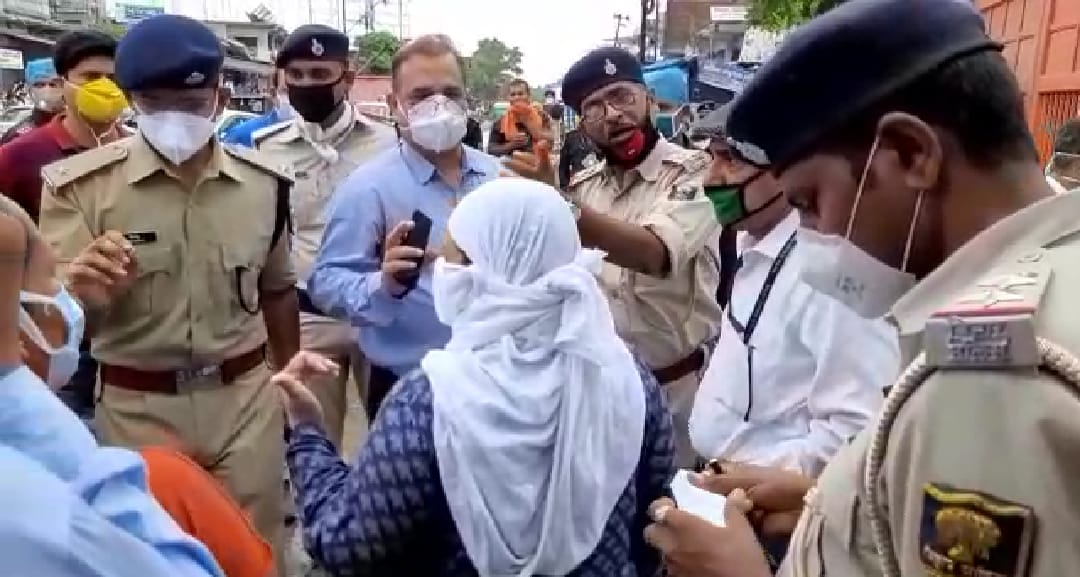
Inadequate number of doctors
On March 23, 2018, in response to a query by Opposition Rashtriya Janata Dal (RJD) MLA Akhtarul Islam Shaheen in Bihar legislative assembly, state’s Health Minister Mangal Pandey revealed there is only 1 doctor for 17, 685 people in the state as opposed to the national average of 1 doctor for 11, 097 people. The World Health Organisation recommends 1 doctor for every 1,000 population.
As per the information provided by the Medical Council of India to the Ministry of Health and Family Welfare, there are a total of 10,41,395 allopathic doctors registered with the State Medical Councils or Medical Council of India as on September 30, 2017. It is estimated that around 8.33 lakh doctors (roughly 80 per cent of the total) may actually be available for active service. Out of this, only 40,043 are registered with the Bihar Medical Council.
The breakup of these numbers highlights a grim situation of the state’s public health system. Bihar has only 1,899 Primary Health Centres (PHCs) out of which 439 PHCs are working with a capacity of four or more than four allopathic doctors. There are 41 PHCs with three doctors, 56 PHCs with two doctors, and 1,363 PHCs with just one doctor. 256 PHCs in Bihar do not have even a single lab technician, 201 PHCs do not have a pharmacist and 156 PHCs are without any lady doctor/lab technician or pharmacist.
With the growing number of COVID-19 suspected and positive cases, the state government has now asked private hospitals to reserve 20-25 per cent beds for COVID-19 patients. The private hospitals had been refusing coronavirus patients until now.
Junior doctors as fillers
Getting junior doctors onboard has become an age-old practice in Bihar. A vast gap in the doctor-population ratio in the state is bridged by them. “It is an economically feasible model for the governments across India. Instead of notifying the required vacancies, governments prefer to have services from ‘interns’ and graduates,” a senior doctor at AIIMS Patna told Gaon Connection on conditions of anonymity. “Strikes called by associations of junior doctors not only have far-reaching impacts on the authorities but also cripples the complete structure of public health in the state,” he added.
In April 2019, a strike called by junior doctors resulted in 15 patients dying due to lack of treatment. In July 2019, junior doctors went on a strike again for three days and 60 surgeries had to be postponed. In November the same year, the functioning of Nalanda Medical College and Hospital was crippled due to the strike of junior doctors.
As per information gathered from junior doctors, at least 1,000 junior doctors are on duty in light of the pandemic.
“Junior doctors are the backbone of the state’s public health system. If they are denied basic precautionary equipment and they fall ill, the public health system in Bihar would collapse,” said Shankar Bharti, a junior doctor from Patna Medical College and Hospital.
A delegation of IMA representatives met Health Minister Mangal Pandey and put forward a list of demands including fortnightly COVID-19 tests for all doctors and the paramedic staff, a mandatory 15-day break as relaxation for the state’s health professionals working in the frontline against the COVID-19.
Gaon Connection has sent a detailed questionnaire to the state health minister. The story will be updated as and when he responds.

